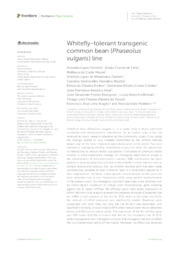Whitefly-tolerant transgenic common bean (Phaseolus vulgaris) line.
Whitefly-tolerant transgenic common bean (Phaseolus vulgaris) line.
Author(s): FERREIRA, A. L.; FARIA, J. C. de; MOURA, M. da C.; ZAIDEM, A. L. de M.; PIZETTA, C. S. R.; FREITAS, E. de O.; COELHO, G. R. C.; SILVA, J. F. A. e; BARRIGOSSI, J. A. F.; HOFFMANN, L. V.; SOUZA, T. L. P. O. de; ARAGÃO, F. J. L.; PINHEIRO, P. V.
Summary: Common bean (Phaseolus vulgaris L.) is a staple food in Brazil with both nutritional and socioeconomic importance. As an orphan crop, it has not received as much research attention as the commodity crops. Crop losses are strongly related to virus diseases transmitted by the whitefly Bemisia tabaci, one of the most important agricultural pests in the world. The main method of managing whitefly-transmitted viruses has been the application of insecticides to reduce vector populations. Compared to chemical vector control, a more sustainable strategy for managing insect-borne viruses is the development of resistant/tolerant cultivars. RNA interference has been applied to develop plant lines resistant to the whitefly in other species, such as tomato, lettuce and tobacco. Still, no whitefly-resistant plant has been made commercially available to date. Common bean is a recalcitrant species to in vitro regeneration; therefore, stable genetic transformation of this plant has been achieved only at low frequencies (<1%) using particle bombardment. In the present work, two transgenic common bean lines were obtained with an intron-hairpin construct to induce post-transcriptional gene silencing against the B. tabaci vATPase (Bt-vATPase) gene, with stable expression of siRNA. Northern blot analysis revealed the presence of bands of expected size for siRNA in leaf samples of the line Bt-22.5, while in the other line (11.5), the amount of siRNA produced was significantly smaller. Bioassays were conducted with both lines, but only the line Bt-22.5 was associated with significant mortality of adult insects (97% when insects were fed on detached leaves and 59% on the whole plant). The expression of the Bt-vATPase gene was 50% lower (p < 0.05) in insects that fed on the transgenic line Bt-22.5, when compared to non-transgenic controls. The transgenic line did not affect the virus transmission ability of the insects. Moreover, no effect was observe on the reproduction of non-target organisms, such as the black aphid Aphis craccivora, the leafminer Liriomyza sp. and the whitefly parasitoid Encarsia formosa. The results presented here serve as a basis for the development of whitefly-tolerant transgenic elite common bean cultivars, with potential to contribute to the management of the whitefly and virus diseases.
Publication year: 2022
Types of publication: Journal article
Unit: Embrapa Rice & Beans
Observation
Some of Embrapa's publications are published as ePub files. To read them, use or download one of the following free software options to your computer or mobile device. Android: Google Play Books; IOS: iBooks; Windows and Linux: Calibre.
Access other publications
Access the Agricultural Research Database (BDPA) to consult Embrapa's full library collection and records.
Visit Embrapa Bookstore to purchase books and other publications sold by Embrapa.

